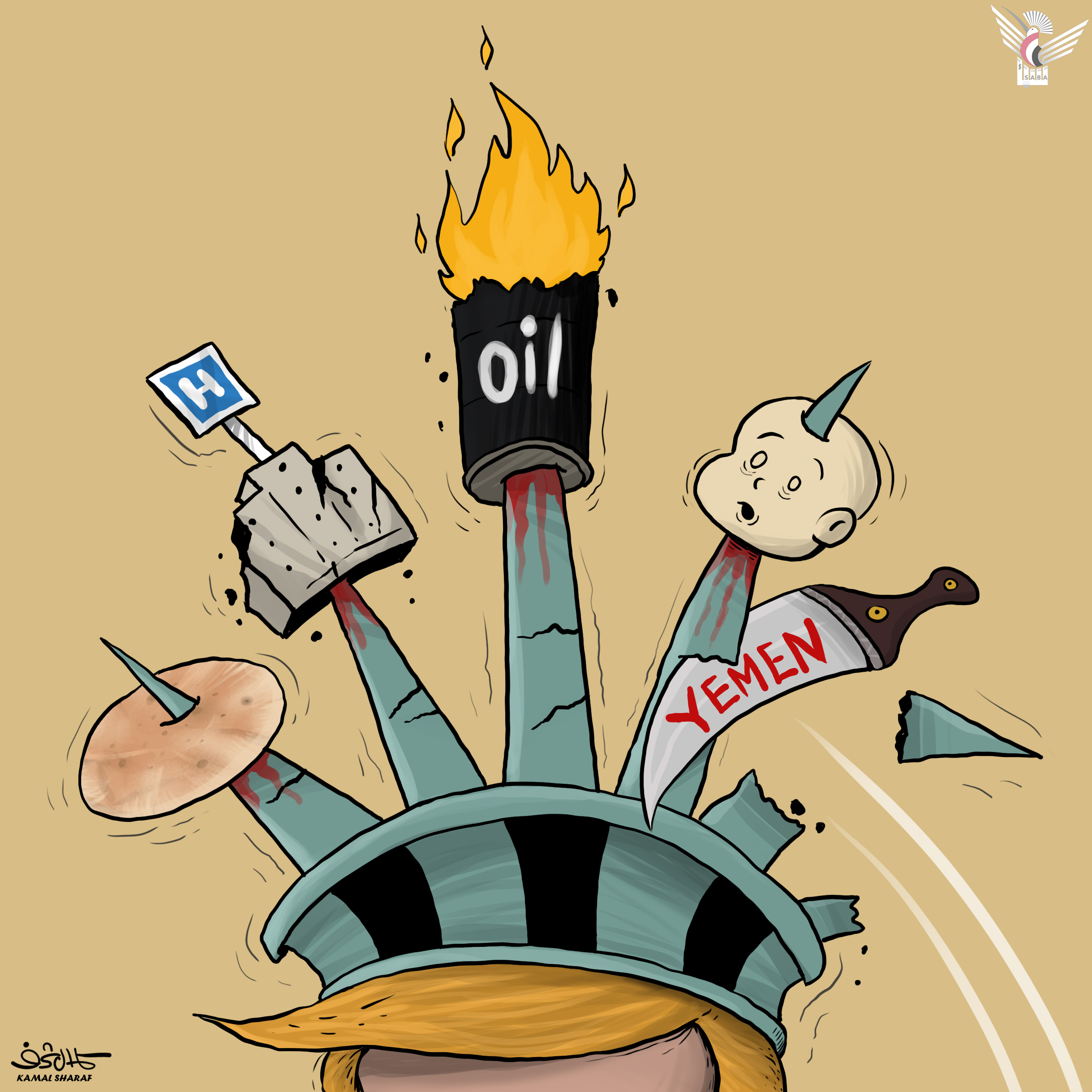SANA'A June 14. 2024 - On Thursday evening, the security services published new confessions of a group of members of the US-Israeli spy network, which the security services announced their arrest.
The confessions of the cell members directly linked to the CIA, which were broadcast through various media outlets, revealed that they targeted the agricultural sector with different addresses, with the participation of the British and Dutch embassies.
The confessions showed the most important parties that worked to target the agricultural sector in Yemen, represented by the US Department of Agriculture in addition to the FAO, noting that there are previous Western studies of the components of agricultural production in Yemen in various northern, northeastern, central and southern governorates.
According to the confessions of a group of cell members, an American strategy has been prepared to target agricultural and livestock production in Yemen since an early stage dating back to the end of the eighties of the last century, and the US Agency for Development and its elements played a key role in targeting the agricultural sector.
The members of the spy cell explained that local USAID elements are still working from outside Yemen to collect information and data from the agricultural sector in order to continue targeting it, as USAID worked to contain research cadres in the Agricultural Research Authority in order to hinder the process of improved varieties and seeds.
The members of the US-Israeli spy cell said that the American authorities worked to establish the Seed Center for Seed Inspection in order to facilitate the entry of very large quantities of weak seeds, and that the seeds that were introduced were infected with pests and some pests such as fire blight and others that cause spiny weeds that damage the agricultural crop.
The spy network's confessions confirmed that it worked to spread spiny seeds in the bottom of Bon and the bottom of Jahran instead of spreading the seeds of vegetables and other crops, while the US Agency for Development worked to target fertile soil and contaminate it with seeds pollinated with epidemics and harmful fertilizers under the rubric of distributing improved seeds that lead to a doubling of agricultural production.
According to the US-Israel spy network group, the purpose of deploying some of the pollinated seeds was to make the soil unsuitable for growing wheat or any other grain, and we worked at USAID to obtain health certificates for various low-quality and epidemic-infected seeds.
The confessions of the spy network dealt with the major role of the British project in the process of reducing wheat cultivation, and one of the British projects was the main role in the deployment of hybrid improved seed varieties with high toxicity or disease.
The spy, Amer al-Aghbari, admitted that he traveled to the United States, met with USAID officials and was briefed on an integrated program for the propagation and dissemination of scale insects with the aim of hindering wheat cultivation in Yemen.
Al-Aghbari admitted that after his return to Yemen, he worked to transport seedlings grafted with scale insects and spread them in the northeastern and central governorates, and to bring thousands of citrus seedlings grafted with insects and epidemics from America under the cover of working to expand citrus cultivation.
"We worked to spread the scale insect because it works to damage the leaves of the fruit and reduce the level of its production, and among the insects that have been spread are mealybugs and black aphid with the approval of some specialists in the Ministry of Agriculture," he said.
"We have worked to establish nurseries for many crops for the purpose of transmitting diseases and endemic trees in various provinces, and the US agency has imported a large quantity of highly toxic pesticides and spread them in the targeted provinces," al-Aghbari said.
He spoke about the coordination of the US agency directly with the German project for the import of pesticides between 2010 and 2012 and facilitated by the competent authorities at that time.
"When I joined the forest development project, we worked very seriously to plant some trees that hinder agricultural production or move insects from one area to another," he said.
Al-Aghbari said that he worked in the forest development project to attract local cadres to propagate different types of seedlings to spread insect diseases, indicating the activities of the USAID strategy, which included targeting post-harvest operations, which is no less dangerous than the first.
"Post-harvest targeting activities focused on disrupting the storage and marketing process and associated special arrangements, and post-harvest targeting activities hindered farmers from obtaining some requirements related to product packaging and optimal storage," he said.
He also acknowledged that USAID had previously funded and established Yemen's main research station in the Jadr area.
Regarding fruit seedlings, Al-Aghbari explained that tens of thousands of grafted fruit seedlings infested with insect diseases and agricultural pests were brought to the Jadr station, or what was known as the Al-Ara farm.
He recalled that USAID worked to bring in different varieties of American and Israeli infested seedlings as well through the horticultural improvement project, and there was coordination between USAID projects and British and Dutch projects in the process of striking cash crops.
Al-Aghbari admitted that he worked in the United Nations Environmental Resources Project and the project's activities were prominent at the time to find gaps in the construction of water barriers, and as a result of the violation of the establishment of these barriers, agricultural land erosion operations were documented in districts of Shabwa governorate.
Al-Aghbari said Dutch projects had a major role in the process of hitting animal production in some governorates, especially Al-Bayda governorate, pointing out that one of the activities targeting livestock is the issuance of health certificates for imported livestock herds, which led to the spread of animal diseases.
Spy Shayef al-Hamdani confirmed that USAID's economic and agricultural growth sector in Yemen has worked to spread epidemics and insects in fruitful agricultural crops under the rubric of pest control.
He explained that the cover of the US agency was to intervene to combat agricultural pests through implementing partners, which are international organizations and others, pointing out that epidemics were spread in certain crops and agricultural products under the pretext of combating pests and insects that affect agricultural crops.
Al-Hamdani admitted that USAID's Economic and Agricultural Growth Sector has systematically targeted livestock, reviewing some of the agency's activities in targeting livestock, including vaccinating animals against diseases that used to affect them and cause their death, and the results were counterproductive.
He pointed out that diseases were spread in animals through vaccination and vaccines supervised and funded by the US Agency for Development, pointing out that USAID activities target poor families dependent on fishing and poultry through projects ostensibly to provide assistance.
E.M
resource : Saba

| more of (Local) |




